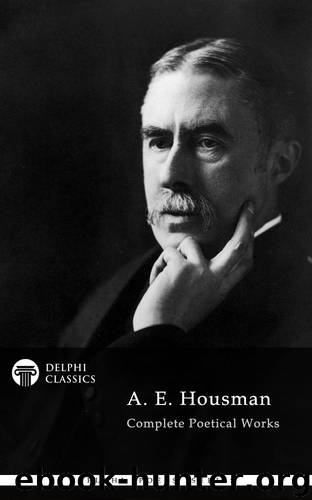Complete Poetical Works of a E Housman by A E Housman

Author:A E Housman
Language: eng
Format: mobi
Publisher: Delphi Classics
Published: 2017-12-09T05:00:00+00:00
The Essays
University College, London, — where Housman worked as a professor for over twenty years
A sketch of Housman, 1906
SWINBURNE
The publication, in 1866, of the late Mr Swinburne’s Poems and Ballads may fairly be called the most conspicuous event in the literary history of the reign of Queen Victoria. We now see that it was not so important an event as it once appeared: its results were not permanent, nor even of long duration; but it was the most moving novelty that the world of letters had seen for many a day or is likely to see for many another. At a time when Victorian verse was at its very tamest, when the two most widely read of recent poems were Enoch Arden and Hiawatha, this trumpet of insurrection excited in young and ardent minds an emotion comparable to what Wordsworth and Coleridge had felt when they witnessed the beginning of the French Revolution. Mr Thomas Hardy has told me that in those days, when he was a young man of six-and-twenty living in London, there was a whole army of young men like himself, not mutually acquainted, who nevertheless, as they met in the streets, could recognise one another as spiritual brethren by a certain outward sign. This sign was an oblong projection at the breast-pocket of the coat. To the gross world of London, enslaved by commerce, respectability, and middle-age, it might have been anything; but the sons of fire who had similar oblongs protruding from their own breast-pockets knew what it was: it was Moxton’s first edition of Poems and Ballads, worn where it should be worn, just over the heart.
When Mr Swinburne died, April 1909, at the age of 72, he might as well have been dead for a quarter of a century. For a quarter of a century and more he had written nothing that mattered. There were not many to buy his books, and fewer still to read them; the poetasters, except the very poorest, had ceased to try to imitate him; the literary world was much interested in other things, good, bad and indifferent, but little interested in the poetry of Mr Swinburne. He still commanded the lip-service of the journalists, who would describe him as our only great living poet; but this they said, not because they believed it was true, but because they hoped, by so saying, to inflict mental anguish on Mr William Watson or Mr Stephen Phillips.
Swinburne in fact was one of those not very numerous poets whom their contemporaries have treated with justice. The different attention which he received at different periods very fairly corresponded to differences, at those periods, in the quality of his writing. He was neither steadily overrated, like Byron, nor steadily underrated, like Shelley, nor, like Wordsworth, derided while he wrote well and celebrated when he wrote well no longer: he received the day’s wages for the day’s work. His first book fell dead, as it deserved; his first good book, Atalanta in Calydon, earned
Download
This site does not store any files on its server. We only index and link to content provided by other sites. Please contact the content providers to delete copyright contents if any and email us, we'll remove relevant links or contents immediately.
| Ancient, Classical & Medieval | Anthologies |
| British & Irish | Japanese & Haiku |
| Love Poems | Regional & Cultural |
| Themes & Styles | United States |
| Women Authors |
The Universe of Us by Lang Leav(14411)
The Sun and Her Flowers by Rupi Kaur(13786)
Adultolescence by Gabbie Hanna(8173)
Whiskey Words & a Shovel II by r.h. Sin(7499)
Love Her Wild by Atticus(7256)
Smoke & Mirrors by Michael Faudet(5546)
Wiseguy by Nicholas Pileggi(4648)
The Princess Saves Herself in This One by Amanda Lovelace(4534)
Love & Misadventure by Lang Leav(4377)
Milk and Honey by Rupi Kaur(4252)
Memories by Lang Leav(4194)
Good morning to Goodnight by Eleni Kaur(3820)
Bluets by Maggie Nelson(3759)
Too Much and Not the Mood by Durga Chew-Bose(3719)
Algedonic by r.h. Sin(3533)
Pillow Thoughts by Courtney Peppernell(3475)
The Poetry of Pablo Neruda by Pablo Neruda(3405)
HER II by Pierre Alex Jeanty(3191)
Stuff I've Been Feeling Lately by Alicia Cook(3067)
